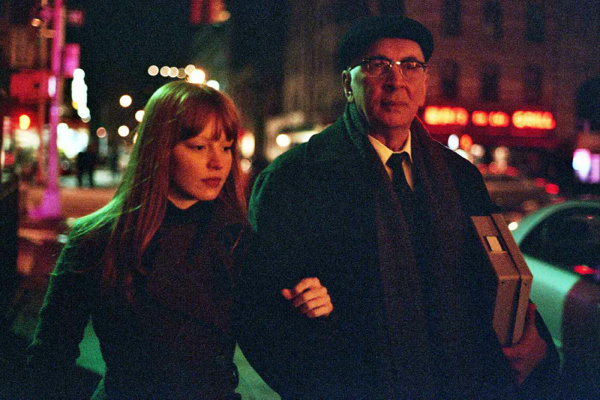Movie review by Greg Carlson
Frank Langella shares a tremendous performance as Leonard Schiller, a fading, aging novelist courted and flattered by the attentions of an ambitious graduate student in “Starting Out in the Evening.” Adapted from the 1998 novel by Brain Morton, Andrew Wagner’s screen adaptation is a literate, quiet experience that will please voracious readers as much as it will bore those who crave action and spectacle. Deliberate, placid and visually quite stunning, the labor of love was shot in less than three weeks on a budget of roughly half a million dollars on location in New York City.
Despite flirting with the pitfalls of a May-December story, “Starting Out in the Evening” sets its sights on a great deal more than the expected trappings. The movie is self-conscious enough to acknowledge the naked ambitions of its central characters, and we get to know them as fully rounded individuals prone to the twists and turns of vanity and self-doubt. The appropriately named Heather Wolfe (Lauren Ambrose) might be the more obviously calculating of the central pair, but the movie doesn’t skimp in revealing just how much the nearly forgotten Schiller basks in the fawning sweet talk of the much younger woman. Who wouldn’t enjoy being called important and underappreciated?
The movie is slightly less compelling when it leaves the company of Schiller and Wolfe for Schiller’s almost forty-year-old daughter Ariel (Lili Taylor). Ariel, desperate to have a child before she reaches middle age, rekindles a romance with an old beau (Adrian Lester) even though he refuses to consider the possibility of starting a family. The draining hourglass metaphor that drives both father and daughter might work better on the page than on the screen. Taylor, however, is an accomplished performer, and her presence in the movie is welcome, especially in the slightly bitter dutifulness she brings to her occupation as the offspring of a once lauded artist.
“Starting Out in the Evening” succeeds in the depiction of Schiller’s caution in the presence of the beguiling Heather. The old man initially keeps his admirer at a distance, painfully aware that a quid pro quo offer is on the table from their first meeting. Heather wants a story, a thesis, and eventually a publication out of the relationship; Schiller knows it but succumbs to his ego anyway. When the opportunity for physical intimacy rolls around (with a kind of persuasive inevitability), the movie hits its stride. An erotically charged pas de deux, beginning with an anointing by honey and ending with a shot of aching restraint, is memorably rendered and thoroughly believable.
Sometimes, the movie comes close to taking itself too seriously. Schiller himself is nearly humorless. Characters occasionally seem to point out the all too obvious, which can feel slightly condescending. “Starting Out in the Evening” is nothing if not earnest, though, and all four of the major actors are terrific. When Schiller and Wolfe venture outside his tastefully appointed Upper West Side hibernaculum, we glimpse the dog-eat-dog enterprise of NYC’s publishing world, stuffed to bursting with cruelty and rejection. It is no wonder the moviemakers side with the austere, old-fashioned wordsmith whose time has come and gone.
